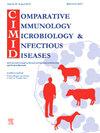Detection and molecular characterization of avian polyomavirus in budgerigar and non-budgerigar psittacine species in bird markets of Pakistan
IF 2
3区 农林科学
Q4 IMMUNOLOGY
Comparative Immunology Microbiology and Infectious Diseases
Pub Date : 2024-10-28
DOI:10.1016/j.cimid.2024.102261
引用次数: 0
Abstract
Avian Polyomaviruses are imposing severe health problems in budgerigars, non-budgerigar Psittacine species, and non-psittacine species all over the world, including Pakistan. It marks future challenges for aviculturists and pet store owners, causing significant financial losses. This study emphasizes the occurrence and molecular characterization of polyomaviruses in budgerigars and non-budgerigar Psittacine species. Thirty-five feather Samples of adult birds and 15 tissue samples of deceased birds were collected for the detection of Avian polyomavirus based on the VP1 gene. Screening of samples by PCR revealed the presence of 550 bp VP1 gene in deceased nestlings of two lovebirds and four budgerigars, while the feather samples of adult birds were all negative for VP1 gene. The overall positive rate of APV in Psittacine birds was 6/50 (12 %), and the distribution frequency of virus among species was 4/19 (20 %) in Budgerigars and 2/31 (6.4 %) in non-budgerigar. Positive samples were subjected to partial sequencing which showed a nucleotide similarity index of VP1 gene between 97.46 % & 99.6 % with reference sequences in GenBank. The main problem that researchers are dealing with is the scarcity of data on the prevalence and identification of APV in Pakistan. This study is a milestone for further research on APV for the diagnosis and development of vaccines.
巴基斯坦鸟类市场虎皮鹦鹉和非虎皮鹦鹉物种中禽类多瘤病毒的检测和分子特征。
鸟类多瘤病毒给包括巴基斯坦在内的世界各地虎皮鹦鹉、非虎皮鹦鹉物种和非鹦鹉物种带来了严重的健康问题。这给鸟类养殖者和宠物店店主带来了挑战,造成了巨大的经济损失。本研究强调虎皮鹦鹉和非虎皮鹦鹉物种中多瘤病毒的发生和分子特征。研究人员采集了 35 份成年鸟类的羽毛样本和 15 份死亡鸟类的组织样本,以 VP1 基因为基础检测鸟类多瘤病毒。通过聚合酶链式反应(PCR)筛选样本,发现两只爱情鸟和四只虎皮鹦鹉的死亡雏鸟体内存在 550 bp 的 VP1 基因,而成鸟羽毛样本的 VP1 基因检测结果均为阴性。鹦鹉类鸟类中 APV 的总体阳性率为 6/50 (12%),虎皮鹦鹉中病毒在不同物种中的分布频率为 4/19 (20%),非虎皮鹦鹉中为 2/31 (6.4%)。对阳性样本进行了部分测序,结果显示 VP1 基因与 GenBank 中参考序列的核苷酸相似度在 97.46 % 和 99.6 % 之间。研究人员面临的主要问题是缺乏有关巴基斯坦 APV 流行和鉴定的数据。这项研究是进一步研究 APV 以进行诊断和开发疫苗的里程碑。
本文章由计算机程序翻译,如有差异,请以英文原文为准。
求助全文
约1分钟内获得全文
求助全文
来源期刊
CiteScore
4.60
自引率
0.00%
发文量
102
审稿时长
40 days
期刊介绍:
Comparative Immunology, Microbiology & Infectious Diseases aims to respond to the concept of "One Medicine" and to provide a venue for scientific exchange. Based on the concept of "Comparative Medicine" interdisciplinary cooperation between specialists in human and animal medicine is of mutual interest and benefit. Therefore, there is need to combine the respective interest of physicians, veterinarians and other health professionals for comparative studies relevant to either human or animal medicine .
The journal is open to subjects of common interest related to the immunology, immunopathology, microbiology, parasitology and epidemiology of human and animal infectious diseases, especially zoonotic infections, and animal models of human infectious diseases. The role of environmental factors in disease emergence is emphasized. CIMID is mainly focusing on applied veterinary and human medicine rather than on fundamental experimental research.

 求助内容:
求助内容: 应助结果提醒方式:
应助结果提醒方式:


